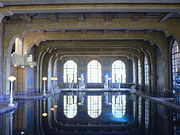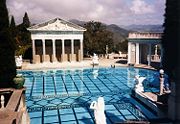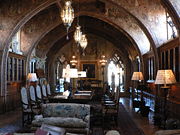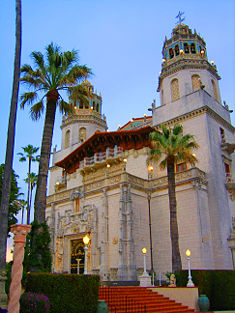Hearst Castle
| Hearst San Simeon Estate |
| (U.S. National Historic Landmark) |
|
The Hearst Castle facade is patterned after a Spanish cathedral.
|
| Nearest city: |
San Simeon, California, USA |
| Area: |
More than 90,000 sq. ft. |
| Built/Founded: |
1919 |
| Architect: |
William Randolph Hearst; Julia Morgan |
| Architectural style(s): |
Late 19th and 20th Century Revivals, Other |
| Added to NRHP: |
June 22, 1972 |
| NRHP Reference#: |
72000253
[1]
|
| Governing body: |
State |
- Not to be confused with Hurst Castle, Henry VIII's Device Fort near Portsmouth in England.
Hearst Castle is the palatial estate built by newspaper magnate William Randolph Hearst. It is located near San Simeon, California, on a hill overlooking the Pacific Ocean, halfway between Los Angeles and San Francisco. Donated by the Hearst Corporation to the state of California in 1957, it is now a State Historical Monument and a National Historic Landmark, open for public tours. Hearst formally named the estate "La Cuesta Encantada" ("The Enchanted Hill"), but he usually just called it "the ranch". The castle and grounds are also sometimes referred to as "San Simeon" without distinguishing between the Hearst property and the unincorporated town of the same name.
History
Hearst Castle was built on a 40,000 acre (160 km²) ranch that William Randolph Hearst's father, George Hearst, originally purchased in 1865. The younger Hearst grew fond of this site over many childhood family camping trips. He inherited the ranch, which had grown to 250,000 acres (1,000 km²), from his mother, Phoebe Hearst, upon her death in 1919.[2] Construction began that same year and continued through 1947, when he stopped living at the estate due to ill health. San Francisco architect Julia Morgan designed most of the buildings. Hearst was an inveterate tinkerer, and would tear down structures and rebuild them at a whim. For example, the opulent Neptune Pool was rebuilt three times before Hearst was satisfied. As a consequence of Hearst's persistent design changes, the estate was never completed in his lifetime.

The indoor pool, modeled after Roman baths, with gold mosaic tiles.
The estate is a pastiche of historic architectural styles that Hearst admired in his travels around Europe. For example, the main house is modeled after a 16th century Spanish cathedral, while the outdoor swimming pool features an ancient Roman temple front transported wholesale from Europe and reconstructed at the site. Hearst furnished the estate with truckloads of art, antiques, and even whole ceilings that he acquired in their entirety from Europe and Egypt.
Hearst Castle featured 56 bedrooms, 61 bathrooms, 19 sitting rooms, 127 acres (0.51 km2) of gardens, indoor and outdoor swimming pools, tennis courts, a movie theater, an airfield, and the world's largest private zoo. Zebras and other exotic animals still roam the grounds. Morgan, an accomplished civil engineer, devised a gravity-based water delivery system from a nearby mountain. One highlight of the estate is the Neptune Pool, which features an expansive vista of the mountains, ocean and the main house.

The Neptune Pool looks out to the mountains of the central coast.
Invitations to Hearst Castle were highly coveted during its heyday in the 1920s and '30s. The Hollywood and political elite often visited, usually flying into the estate's airfield or taking a private Hearst-owned train car from Los Angeles. Charlie Chaplin, Cary Grant, the Marx Brothers, Charles Lindbergh, Joan Crawford, Clark Gable, Jimmy Stewart, Bob Hope, Calvin Coolidge, Franklin Roosevelt, and Winston Churchill were among Hearst's A-list guests. While guests were expected to attend the formal dinners each evening, they were normally left to their own devices during the day while Hearst directed his business affairs. Since "the Ranch" had so many facilities, guests were rarely at a loss for things to do. The estate's theater usually screened films from Hearst's own movie studio, Cosmopolitan Productions. Hearst Castle became so famous that it was caricatured in the 1941 Orson Welles film Citizen Kane as Charles Foster Kane's "Xanadu". The estate is portrayed as a gloomy and ridiculously self-indulgent barony.

The Gothic Study.
One condition of the Hearst Corporation's donation of the estate was that the Hearst family would be allowed to use it when they wished. Patty Hearst, a granddaughter of William Randolph, related that as a child, she hid behind statues in the Neptune Pool while tours passed by. Although the main estate is now a museum, the Hearst family continues to use an older Victorian house on the property as a retreat — the original house built by George Hearst in the late 19th century. The house is screened from tourist routes by a dense grove of eucalyptus, to provide maximum privacy for the guests. In 2001, Patty Hearst hosted a Travel Channel show on the estate, and Amanda Hearst modeled for a fashion photo shoot at the estate for a Hearst Corporation magazine, Town and Country, in 2006.
Size
The total square footage of the castles on the estate exceeds 90,000 square feet (8,300 m²). The area of Casa Grande, the "castle", is 60,645 square feet (5,634 m²). The area of the guest houses on the property are:[3]
- Casa del Mar: 5,875 square feet (546 m²)
- Casa del Monte: 2,291 square feet (213 m²)
- Casa del Sol: 2,604 square feet (242 m²)
Location
Hearst Castle is located near San Simeon, California, about 250 miles (400 km) from both Los Angeles and San Francisco, and 43 miles (69 km) from San Luis Obispo.
The castle itself is five miles (eight kilometers) inland on a hill. Access is only by a scheduled tour bus, and as of 2008 tickets are USD$24-$30 depending on the season and time of day. Reservations are recommended during busy periods such as summer, weekends and holidays. Evening tours with Living History docents portraying Hearst's guests and visitors are available typically Sept to May.
Directly across the street from the entrance is San Simeon State Park, which features a fishing pier and a public park.
Gallery
Sources
- Lewis, O. (1958). Fabulous San Simeon; a history of the Hearst Castle, a Calif. state monument located on the scenic coast of Calif., together with a guide to the treasures on display. San Francisco: California Historical Society.
- Collord, M., & Miller, A. (1972). Castle fare: featuring authentic recipes served in Hearst Castle. San Luis Obispo, CA: Blake Printery.
- Boulian, D. M. (1972). Enchanted gardens of Hearst Castle. Cambria, Calif: Phildor Press.
- Martin, C. (1977). Hearst Castle: mythology, legend, history in art. Cambria, Calif: Galatea Publications.
- Coffman, T. (1985).
- Morgan, J., Hearst, W. R., & Loe, N. E. (1987). San Simeon revisited: the correspondence between architect Julia Morgan and William Randolph Hearst. San Luis Obispo, Calif: Library Associates, California Polytechnic State University.
- Blades, J., Nargizian, R. A., & Carr, G. (1993). The Hearst Castle collection of carpets: fine rug reproductions. Santa Barbara, Calif: Jane Freeburg.
- Kastner, V. (1994). Remains to be seen: remains of Spanish ceilings at Hearst Castle. San Simeon, CA: Hearst San Simeon State Historic Monument.
- Loe, N. E. (1994). Hearst Castle: an interpretive history of W.R. Hearst's San Simeon estate. [S.l.]: ARA Services.
- Sullivan, J. (1996). Castle chronicles: : "sketching around Hearst Castle". Los Osos, Calif: The Bay News?.
- California. (2001). Hearst Castle: Hearst San Simeon State Historical Monument. Sacramento, CA: California State Parks.
References
External links
- Hearst Castle is at coordinates
|
Protected Areas of California |
|
| National Park System |
National Parks: Channel Islands • Death Valley • Joshua Tree • Kings Canyon • Lassen Volcanic • Redwood • Sequoia • Yosemite
National Monuments: Cabrillo • Devils Postpile • Lava Beds • Muir Woods • Pinnacles
National Seashores: Point Reyes
National Preserves: Mojave
National Historical Parks: Rosie the Riveter/World War II Home Front • San Francisco Maritime
National Historic Sites: Eugene O'Neill • Fort Point • John Muir • Manzanar
National Recreation Areas: Golden Gate • Santa Monica Mountains • Whiskeytown
|
|
| State Parks |
State Parks: Ahjumawi Lava Springs • Andrew Molera • Angel Island • Annadel • Año Nuevo • Anza-Borrego Desert • Arthur B. Ripley Desert Woodland • Bidwell-Sacramento River • Big Basin Redwoods • Big River • Border Field • Bothe-Napa Valley • Burton Creek • Butano • Calaveras Big Trees • Castle Crags • Castle Rock • Caswell Memorial • China Camp • Chino Hills • Clear Lake • Crystal Cove • Cuyamaca Rancho • D. L. Bliss • Del Norte Coast Redwoods • Donner Memorial • Eastshore • El Escorpion • Emerald Bay • Fort Ord Dunes • Fremont Peak • Garrapata • Gaviota • Great Valley Grasslands • Grizzly Creek Redwoods • Grover Hot Springs • Hendy Woods • Henry Cowell Redwoods • Henry W. Coe • Humboldt Lagoons • Humboldt Redwoods • Jedediah Smith Redwoods • Julia Pfeiffer Burns • Leo Carrillo • Limekiln • MacKerricher • Malibu Creek • Manchester • McArthur-Burney Falls Memorial • Mendocino Headlands • Mendocino Woodlands • Montaña de Oro • Morro Bay • Mount Diablo • Mount San Jacinto • Mount Tamalpais • Navarro River Redwoods • Pacheco • Palomar Mountain • Patrick's Point • Pfeiffer Big Sur • Placerita Canyon • Plumas-Eureka • Point Mugu • Portola Redwoods • Prairie Creek Redwoods • Red Rock Canyon • Richardson Grove • Rio de Los Angeles • Robert Louis Stevenson • Russian Gulch • Saddleback Butte • Salt Point • Samuel P. Taylor • San Bruno Mountain • San Simeon • Sinkyone Wilderness • South Yuba River • Sugar Pine Point • Sugarloaf Ridge • Sutter Buttes • The Forest of Nisene Marks • Tolowa Dunes • Tomales Bay • Topanga • Van Damme • Washoe Meadows • Wilder Ranch
State Reserves: Año Nuevo • Antelope Valley California Poppy • Armstrong Redwoods • Azalea • Caspar Headlands • John B. Dewitt • John Little • Jug Handle • Kruse Rhododendron • Los Osos Oaks • Mailliard Redwoods • Mono Lake Tufa • Montgomery Woods • Point Lobos • Smithe Redwoods • Torrey Pines • Tule Elk
State Marine Reserves: Albany • Emeryville Crescent
State Historic Parks: Anderson Marsh • Antelope Valley Indian Museum • Bale Grist Mill • Benicia Capitol • Bidwell Mansion • Bodie • California Citrus • California State Indian Museum • Chumash Painted Cave • Colonel Allensworth • Columbia • Cowell Ranch/John Marsh • El Presidio de Santa Barbara • Empire Mine • Folsom Powerhouse • Fort Humboldt • Fort Ross • Fort Tejon • Governor's Mansion • Hearst San Simeon • Indian Grinding Rock • Jack London • La Purísima Mission • Leland Stanford Mansion • Los Angeles • Los Encinos • Malakoff Diggins • Marconi Conference Center • Marshall Gold Discovery • Monterey • Old Sacramento • Old Town San Diego • Olompali • Petaluma Adobe • Pigeon Point Light Station • Pío Pico • Point Sur • Railtown 1897 • San Juan Bautista • San Pasqual Battlefield • Santa Cruz Mission • Santa Susana Pass • Shasta • Sonoma • Sutter's Fort • Tomo-Kahni • Wassama Round House • Watts Towers of Simon Rodia • Weaverville Joss House • Will Rogers • William B. Ide Adobe • Woodland Opera House
State Beaches: Asilomar • Bean Hollow • Bolsa Chica • Cardiff • Carlsbad • Carmel River • Carpinteria • Caspar Headlands • Cayucos • Corona del Mar • Dockweiler • Doheny • El Capitán • El Porto • Emma Wood • Gray Whale Cove • Greenwood • Half Moon Bay • Huntington • Leucadia • Lighthouse Field • Little River • Malibu Lagoon • Mandalay • Manresa • Marina • McGrath • Montara • Monterey • Moonlight • Morro Strand • Moss Landing • Natural Bridges • New Brighton • Pacifica • Pelican • Pescadero • Pismo • Point Dume • Point Sal • Pomponio • Refugio • Robert H. Meyer Memorial • Robert W. Crown Memorial • Salinas River • San Buenaventura • San Clemente • San Elijo • San Gregorio • San Onofre • Santa Monica • Schooner Gulch • Seacliff • Silver Strand • Sonoma Coast • South Carlsbad • Sunset • Thornton • Torrey Pines • Trinidad • Twin Lakes • Westport-Union Landing • Will Rogers • William Randolph Hearst Memorial • Zmudowski
State Recreation Areas: Admiral William Standley • Auburn • Austin Creek • Benbow Lake • Benicia • Bethany Reservoir • Brannan Island • Candlestick Point • Castaic Lake • Colusa-Sacramento River • Folsom Lake • Franks Tract • George J. Hatfield • Harry A. Merlo • Kenneth Hahn • Kings Beach • Lake Del Valle • Lake Oroville • Lake Perris • Lake Valley • McConnell • Millerton Lake • Picacho • Providence Mountains • Salton Sea • San Luis Reservoir • Silverwood Lake • Standish-Hickey • Tahoe • Turlock Lake • Woodson Bridge
State Vehicular Recreation Areas: Carnegie • Clay Pit • Heber Dunes • Hollister Hills • Hungry Valley • Oceano Dunes • Ocotillo Wells • Prairie City
Other: Burleigh H. Murray Ranch • California Mining and Mineral Museum • California State Capitol Museum • California State Railroad Museum • Castro Adobe • Delta Meadows • Estero Bay • Hatton Canyon • Indio Hills Palms • Marital Cottle Project • Point Cabrillo Light Station • Point Lobos Ranch • Point Montara Light Station • Reynolds Wayside Campground • San Timoteo Canyon • Stone Lake • Verdugo Mountains • Ward Creek • Wildwood Canyon
|
|
| National Forests |
National Forests: Angeles • Cleveland • Eldorado • Inyo • Klamath • Lassen • Los Padres • Mendocino • Modoc • Plumas • San Bernardino • Sequoia • Shasta-Trinity • Sierra • Six Rivers • Stanislaus • Tahoe
Other: Butte Valley National Grassland • Giant Sequoia National Monument • Santa Rosa and San Jacinto Mountains National Monument • Smith River National Recreation Area • Shasta-Trinity National Recreation Area
|
|
| State Forests |
Boggs Mountain Demonstration • Ellen Pickett • Jackson Demonstration • Las Posadas • LaTour Demonstration • Mount Zion • Mountain Home Demonstration • Soquel Demonstration
|
|
| National Wildlife Refuges |
Antioch Dunes • Bitter Creek • Blue Ridge • Butte Sink • Castle Rock • Clear Lake • Coachella Valley • Colusa • Delevan • Don Edwards San Francisco Bay • Ellicott Slough • Farallon • Guadalupe-Nipomo Dunes • Hopper Mountain • Humboldt Bay • Kern • Lower Klamath • Marin Islands • Merced • Modoc • Pixley • Sacramento • Sacramento River • Salinas River • San Diego Bay • San Diego • San Joaquin River • San Luis • San Pablo Bay • Seal Beach • Sonny Bono Salton Sea • Stone Lakes • Sutter • Tijuana Slough • Tule Lake
|
|
| State Wildlife Areas |
Wildlife Areas: Antelope Valley • Ash Creek • Bass Hill • Battle Creek • Big Lagoon • Big Sandy • Biscar • Butte Valley • Buttermilk Country • Cache Creek • Camp Cady • Cantara/Ney Springs • Cedar Roughs • Cinder Flats • Collins Eddy • Colusa Bypass • Coon Hollow • Cottonwood Creek • Crescent City Marsh • Crocker Meadows • Daugherty Hill • Decker Island • Doyle • Dutch Flat • Eastlker River • Eel River • Elk Creek Wetlands • Elk River • Fay Slough • Feather River • Fitzhugh Creek • Fremont Weir • Grass Lake • Gray Lodge • Green Creek • Grizzly Island • Hallelujah Junction • Heenan Lake • Hill Slough • Hollenbeck Canyon • Honey Lake • Hope Valley • Horseshoe Ranch • Imperial • Indian Valley • Kelso Peak and Old Dad Mountains • Kinsman Flat • Knoxville • Laguna • Lake Berryessa • Lake Earl • Lake Sonoma • Little Panoche Reservoir • Los Banos • Lower Sherman Island • Mad River Slough • Marble Mountains • Mendota • Merrill's Landing • Miner Slough • Monache Meadows • Morro Bay • Moss Landing • Mouth of Cottonwood Creek • Napa-Sonoma Marshes • North Grasslands • O'Neill Forebay • Oroville • Petaluma Marsh • Pickel Meadow • Pine Creek • Point Edith • Putah Creek • Rector Reservoir • Red Lake • Rhode Island • Sacramento River • San Felipe Valley • San Jacinto • San Luis Obispo • San Luis Reservoir • San Pablo Bay • Santa Rosa • Shasta Valley • Silver Creek • Slinkard/Little Antelope • Smithneck Creek • South Fork • Spenceville • Surprise Valley • Sutter Bypass • Tehama • Truckee River • Upper Butte Basin • Volta • Warner Valley • Waukell Creek • West Hilmar • Westlker River • White Slough • Willow Creek • Yolo Bypass
Ecological Reserves: Albany Mudflats • Alkali Sink • Allensworth • Atascadero Creek Marsh • Bair Island • Baldwin Lake • Batiquitos Lagoon • Blue Sky • Boden Canyon • Boggs Lake • Bolsa Chica • Bonny Doon • Buena Vista Lagoon • Butler Slough • Butte Creek Canyon • Butte Creek House • Buttonwillow • By Day Creek • Calhoun Cut • Canebrake • Carlsbad Highlands • Carmel Bay • Carrizo Canyon • Carrizo Plains • China Point • Clover Creek • Coachella Valley • Coal Canyon • Corte Madera Marsh • Crestridge • Dairy Mart Ponds • Dales Lake • Del Mar Landing • Elkhorn Slough • Estelle Mountain • Fall River Mills • Fish Slough • Fremont Valley • Goleta Slough • Indian Joe Spring • Kaweah • Kerman • King Clone • Laguna Laurel • Loch Lomond Vernal Pool • Lokern • Magnesia Spring • Marin Islands • Mattole River • McGinty Mountain • Morro Dunes • Morro Rock • Napa River • North Table Mountain • Oasis Spring • Panoche Hills • Peytonia Slough • Piute Creek • Pleasant Valley • Point Lobos • Rancho Jamul • Redwood Shores • River Springs Lakes • Saline Valley • San Dieguito Lagoon • San Elijo Lagoon • San Felipe Creek • San Joaquin River • Santa Rosa Plateau • Springville • Stone Corral • Sycamore Canyon • Sycuan Peak • Thomes Creek • Tomales Bay • Upper Newport Bay • Watsonville Slough • West Mojave Desert • Woodbridge • Yaudanchi
Marine Protected Areas: Abalone Cove • Agua Hedionda Lagoon • Albany Mudflats • Anacapa • Anacapa • Año Nuevo • Asilomar • Atascadero Beach • Bair Island • Batiquitos Lagoon • Big Creek • Big Creek • Big Sycamore Canyon • Bodega • Bolsa Chica • Buena Vista Lagoon • Cambria • Cardiff and San Elijo • Carmel Bay • Carmel Pinnacles • Carrington Point • Catalina Marine Science Center • Corte Madera Marsh • Crystal Cove • Dana Point • Del Mar Landing • Doheny • Doheny • Duxbury Reef • Edward F. Ricketts • Elkhorn Slough • Elkhorn Slough • Encinitas • Estero de Limantour • Fagan Marsh • Farallon Islands • Farnsworth Bank • Fort Ross • Gerstle Cove • Goleta Slough • Greyhound Rock • Gull Island • Harris Point • Heisler Park • Hopkins • Irvine Coast • James V. Fitzgerald • Judith Rock • Julia Pfeiffer Burns • La Jolla • Laguna Beach • Lovers Cove (Catalina Island) • Lovers Point • MacKerricher • Manchester and Arena Rock • Marin Islands • Mia J. Tegner • Moro Cojo Slough • Morro Bay • Morro Bay • Morro Beach • Natural Bridges • Niguel • Pacific Grove Marine Gardens • Painted Cave • Peytonia Slough • Piedras Blancas • Piedras Blancas • Pismo • Pismo-Oceano Beach • Point Buchon • Point Buchon • Point Cabrillo • Point Fermin • Point Lobos • Point Reyes Headlands • Point Sur • Point Sur • Portuguese Ledge • Punta Gorda • Redwood Shores • Refugio • Richardson Rock • Robert E. Badham • Robert W. Crown • Russian Gulch • Salt Point • San Diego-Scripps • San Dieguito Lagoon • San Elijo Lagoon • Santa Barbara Island • Scorpion • Skunk Point • Sonoma Coast • Soquel Canyon • South Laguna Beach • South Point • Tomales Bay • Upper Newport Bay • Van Damme • Vandenberg • White Rock (Cambria)
|
|
National Landscape
Conservation System |
National Monuments: California Coastal • Carrizo Plain • Santa Rosa and San Jacinto Mountains
National Conservation Areas: California Desert • King Range
Wilderness Areas: Ansel Adams • Argus Range • Big Maria Mountains • Bigelow Cholla Garden • Bighorn Mountain • Black Mountain • Bright Star • Bristol Mountains • Cadiz Dunes • Caribou • Carrizo Gorge • Chemehuevi Mountains • Chimney Peak • Chuckwalla Mountains • Cleghorn Lakes • Clipper Mountain • Coso Range • Coyote Mountains • Darwin Falls • Dead Mountains • Domeland • El Paso Mountains • Fish Creek Mountains • Funeral Mountains • Golden Valley • Grass Valley • Hollow Hills • Ibex • Indian Pass • Inyo Mountains • Ishi • Jacumba • John Muir • Kelso Dunes • Kiavah • Kingston Range • Little Chuckwalla Mountains • Little Picacho • Machesna Mountain • Malpais Mesa • Manly Peak • Mecca Hills • Mesquite • Newberry Mountains • Nopah Range • North Algodones Dunes • North Mesquite Mountains • Old Woman Mountains • Orocopia Mountains • Otay Mountain • Owens Peak • Pahrump Valley • Palen/McCoy • Palo Verde Mountains • Picacho Peak • Piper Mountain • Piute Mountains • Red Buttes • Resting Spring Range • Rice Valley • Riverside Mountains • Rodman Mountains • Sacatar Trail • Saddle Peak Hills • San Gabriel • San Gorgonio • San Rafael • Santa Lucia • Santa Rosa • Sawtooth Mountains • Sheephole Valley • Siskiyou • South Nopah Range • Stateline • Stepladder Mountains • Surprise Canyon • Sylvania Mountains • Thousand Lakes • Trilobite • Trinity Alps • Turtle Mountains • Ventana • Whipple Mountains • Yolla Bolly-Middle Eel
|
|
National Marine
Sanctuaries |
Channel Islands • Cordell Bank • Gulf of the Farallones • Monterey Bay
|
|
National Estuarine
Research Reserves |
Elkhorn Slough • San Francisco Bay • Tijuana River
|
|
University of California
Natural Reserve System |
Año Nuevo Island • Bodega Marine • Box Springs • Boyd Deep Canyon Desert Research Center • Burns Piñon Ridge • Carpinteria Salt Marsh • Chickering American River • Coal Oil Point • Dawson Los Monos Canyon • Eagle Lake Field Station • Elliott Chaparral • Emerson Oaks • Fort Ord • Hastings • James San Jacinto Mountains • Jenny Pygmy Forest • Jepson Prairie • Kendall-Frost Mission Bay Marsh • Kenneth S. Norris Rancho Marino • Landels-Hill Big Creek • McLaughlin • Motte Rimrock • Quail Ridge • Sagehen Creek Field Station • San Joaquin Freshwater Marsh • Santa Cruz Island • Scripps Coastal • Sedgwick • Stebbins Cold Canyon • Stunt Ranch Santa Monica Mountains • Sweeney Granite Mountains Desert Research Center • Valentine Eastern Sierra • Younger Lagoon
|
|
Heritage registers: World Heritage Sites • World Network of Biosphere Reserves • National Register of Historic Places • National Historic Landmarks • National Natural Landmarks • California Historical Landmarks • California Points of Historical Interest • California Register of Historical Resources
|
|



